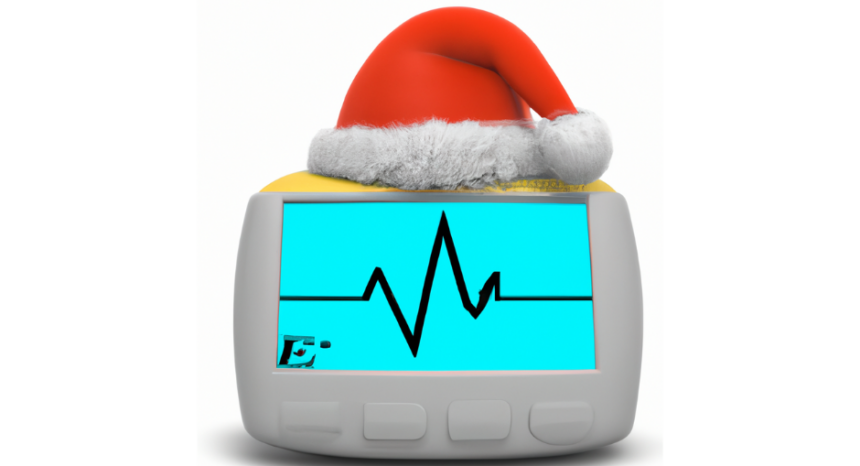Every year, The BMJ publishes a special two-week Christmas issue with a mix of quirky and light-hearted comment articles, features and original research. The research articles go through the journal’s usual peer review process and are all real scientific papers, according to the journal, one of the oldest and most highly-cited medical journals in the world.
After another tough year of news, we wanted to wrap up the year for journalists with a fun feature, courtesy of studies in this year’s BMJ Christmas issue:
In “The Gift That Won’t Keep On Giving: Ban Coal as Punishment at Christmas,” Dr. Tamsin Holland Brown and students Lilac Holland Brown and Marigold Holland Brown — both of whom attend Thriplow Primary School in Cambridge — argue that Santa Claus should phase out giving to coal to naughty kids. Coal is “damaging to their health and the environment,” they write.
The research team does offer an alternative: “To ease anxiety over the climate crisis, children might be encouraged to create or source recycled or upcycled gifts, expand their dietary choices by trying out plant based foods, and go on walks or bike rides in nature (sometimes referred to as ecotherapy),” they write. “Other gifts that could support children’s wellbeing include novels with tales that inspire or reassure, and, possibly, for those who are ready to take on the responsibility, a small pet such as a stick insect.”
“She-Hulk: An Incredible Case of Transfusion Associated Graft versus Host Disease,” analyzes a “high profile” case of non-lethal transfusion associated graft versus host disease, a rare complication from blood transfusion, due to inadvertent blood contamination of an open wound after a car crash. The recipient of the contaminated blood was left with an unexpected side effect, inheriting the ability to transform into an “enormous green rage monster” from the donor.
Because of the celebrity nature of the case, both the donor and recipient are identified. The donor is “Bruce Banner MD, PhD, PhD, PhD, PhD, PhD, PhD, PhD, otherwise known as the strongest Avenger.” (In the 2017 Marvel Studios movie “Thor: Ragnarok” viewers learn that Banner – known better as his alter ego, the Incredible Hulk – has seven PhDs.) The recipient is “Jennifer Walters, JD — also known as She-Hulk of high profile law firm Goodman, Lieber, Kurtzberg, and Holliway, the only legal firm in the world representing superhuman clients.” (Banner is Walters’ cousin.)
The transfusion “merely transferred superhuman abilities,” reports the study’s author, Dr. Neil Barrett, who leaves the readers with a bigger take-home message: “While superheroes as blood and bone marrow donors capture the imagination, the safety of engaging superpowered individuals as donors is far from established. However, it is hoped that this case encourages normal humans to donate blood—allowing them to become the real heroes.”
In “Electrocardiogaffe,” researchers point out that many online media images of electrocardiograph — the line with several small peaks and a large one meant to represent the heartbeat — are “outright bizarre complexes, previously unrecognized in clinical practice.” Hence the name “electrocardiogaffe.”
On a slightly more serious note, in “A Christmas Themed Physical Activity Intervention to Increase Participation in Physical Activity During Advent: Pilot Randomized Controlled Trial,” researchers find that a Christmas-themed physical activity intervention during Advent reduced the 107 participants’ sedentary time and “showed promise for increasing participation in physical activity.”
The intervention was an email sent to participants each day of Advent – Dec. 1-24, 2021, containing a Christmas-themed physical activity idea to be completed that day. Each physical activity idea was presented in three intensity formats, including Easy Elf (light intensity), Moderate Mrs. Claus (moderate intensity), and Strenuous Santa (vigorous intensity). The control group received a leaflet about healthy living on Dec 1.
“Enjoyment of, and adherence to the intervention shows that the public would welcome public health campaigns to help them become more physically active and less sedentary during the Christmas holiday season,” the authors write.
Also fun to read:
- “I Tried to Survive As A Doctor in The Sims 4,” which is one doctor’s account of being a virtual doctor in The Sims 4 video game.
- “Direct Uptake of Nutrition and Caffeine Study (DUNCS): Biscuit Based Comparative Study,” which aims to identify the time required to achieve optimal palatability of a cup of tea using the resources available in a standard hospital staff room, and the best accompanying biscuit for “nutritional content, crunchiness, and integrity when dunking.”


Expert Commentary